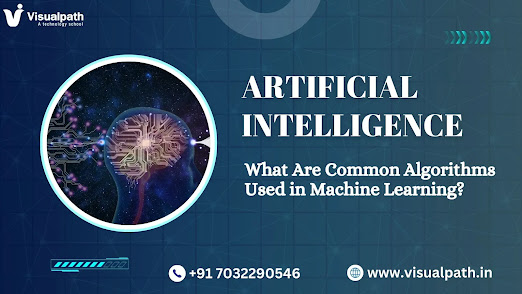- Get link
- X
- Other Apps
- Get link
- X
- Other Apps
What Are Common Algorithms Used in Machine Learning?
Machine
Learning (ML) has revolutionized the way businesses solve problems and make
decisions. From personalized ads to fraud detection, ML algorithms are powering
countless real-world applications. A key aspect of understanding machine
learning is getting familiar with the algorithms that drive these intelligent
systems. In this article, we explore the answer to “What are common algorithms used in Machine Learning?”
If you’re looking to build a career in AI, enrolling in an Artificial
Intelligence Online Course can give you the practical knowledge
needed to understand and apply these algorithms effectively.
 |
| What Are Common Algorithms Used in Machine Learning? |
1. Supervised Learning Algorithms
Supervised learning is the most widely used category in machine
learning. These algorithms work with labeled data, meaning the output is
already known.
·
Linear Regression:
Used for predicting continuous values like price or temperature
·
Logistic Regression:
Ideal for binary classification problems such as spam detection or disease
prediction.
·
Decision Trees:
A flowchart-like tree structure used for classification and regression tasks.
It splits data based on the value of input features.
·
Naive Bayes:
Based on Bayes’ theorem, it’s especially effective for text classification
problems like sentiment analysis or spam filtering.
These supervised learning methods are often the starting point for
professionals at an Artificial
Intelligence Training Institute because of their simplicity and
real-world applicability.
2. Unsupervised Learning Algorithms
Unsupervised learning deals with unlabeled data and aims to discover
hidden patterns or groupings.
·
Hierarchical Clustering:
Builds a hierarchy of clusters. It is often visualized as a dendrogram to
understand the structure of data.
·
Principal
Component Analysis (PCA):
Used for dimensionality reduction. It simplifies large datasets while
preserving trends and patterns.
·
Autoencoders:
These neural networks learn to compress data and then reconstruct it. They’re
used in noise reduction and feature learning.
These unsupervised algorithms are important for data scientists who want
to uncover hidden insights in large datasets.
3. Reinforcement Learning Algorithms
Reinforcement learning focuses on training agents to make decisions by
rewarding them for good actions and penalizing bad ones.
·
Q-Learning:
A value-based method that helps an agent learn optimal policies for
decision-making.
·
Policy Gradient Methods:
These learn the policy directly and are useful in robotics and games like chess
and Go.
Reinforcement learning is critical in building intelligent systems that
adapt to their environments over time.
This broad overview is essential for anyone undergoing Artificial
Intelligence Training, especially those aiming to specialize in
robotics or game AI.
4. Deep Learning Algorithms
Deep learning is a subset of machine learning that uses neural networks
with many layers.
·
Convolutional Neural Networks (CNNs):
Designed for image and video recognition. CNNs are the go-to architecture for
computer vision tasks.
·
Recurrent Neural Networks (RNNs):
RNNs can remember previous inputs, making them ideal for translation and speech
recognition.
·
Generative Adversarial Networks (GANs):
Consists of two networks—a generator and a discriminator—that work together to
create realistic synthetic data.
These models are part of what makes AI applications appear
"intelligent" and adaptable. Understanding deep learning is crucial in
today’s data-driven landscape.
Conclusion
Understanding what common algorithms are used in Machine Learning is the first step toward
mastering artificial intelligence. From linear regression and decision trees to
deep neural networks and GANs, each algorithm plays a specific role in making
machines smarter. Whether you're aiming to work in healthcare, finance,
marketing, or autonomous vehicles, knowledge of these algorithms is a
foundational skill.
If you're serious about building a future-proof career in AI, enrolling
in an Artificial Intelligence Training program is a smart move.
It not only teaches you the theory behind these algorithms but also provides
hands-on experience through real-world projects.
Trending Courses: SAP AI, Azure
Solution Architect, Azure
Data Engineering,
Visualpath stands out as the best
online software training institute in Hyderabad.
For More Information about the Artificial Intelligence Online
Training
Contact Call/WhatsApp: +91-7032290546
Visit: https://www.visualpath.in/artificial-intelligence-training.html
Ai Ml Course
Ai Ml Courses In Hyderabad
Artificial Intelligence Coaching Near Me
Artificial Intelligence Course Online
Artificial Intelligence Online Course
- Get link
- X
- Other Apps
Comments
Post a Comment